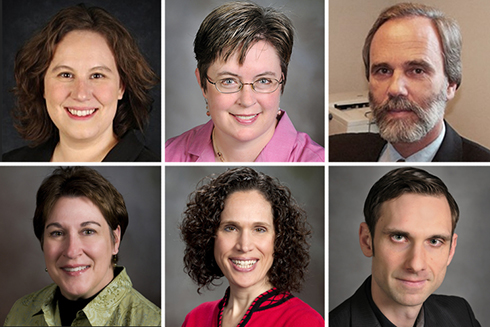Summer Scholars Program funds research that spans continents, lifespans

The Virginia Tech Institute for Society, Culture and Environment’s Summer Scholars Program will fund five projects to tackle widespread issues such as diminishing memory in older adults, childhood obesity, early autism detection, learning abilities in high-risk infants, and post-conflict reconstruction of community.
Faculty of diverse expertise will use their awards — ranging from just over $7,000 to $26,000 — to conduct preliminary research that will lead to submission of competitive proposals for major grant awards from external sources, according to Karen Roberto, director of the Institute for Society, Culture and Environment.
The start-up funds allow researchers to collect much-needed pilot data through health-care machinery use, faculty stipends, participant incentives, and test development.
Support from the institute allows researchers to develop their projects more fully and provides a competitive edge to their proposals.
“The Summer Scholars Program allowed me to do what I would not have been able to do otherwise, which was hire undergraduate students to develop an app that is now fully functional and part of the research,” said France Bélanger, a professor of accounting and information systems in the Pamplin College of Business, who collaborated with Robert Crossler, an accounting Ph.D graduate, on a 2013 Summer Scholars project to improve individual mobile information privacy practices. “That app really made a difference in our submission to the National Science Foundation.”
Belanger said one of the great advantages of the Summer Scholars Program was the opportunity to work with the institutes’ experienced program officer and grant writer, Betsy McDonel Herr, which made the proposal more competitive.
Likewise, Anisa Zvonkovic, a social scientist and head of the Department of Human Development, said the Summer Scholars Program was vital to her research.
Last year, she partnered with Katrina Powell, a rhetorician and an associate professor in the Department of English, to analyze qualitative narratives and interviews of women navigating spatial and identity transitions. Not only did the Summer Scholars Program allow the team to develop their research, it strengthened their interdisciplinary bond.
“Support for our interdisciplinary collaboration allowed us to come to better understand how each other thinks and to find an entryway into how we approach research,” Zvonkovic said. “As a result, we will be submitting a major research proposal to the National Institutes of Health to study what the closures of the Virginia Training Centers for persons with the intellectual and developmental disabilities mean for individuals and their families and how the policy change has nuanced implications for the effects of displacements on families and communities.”
The 2014 Summer Scholars and their projects are:
- Rachel Diana, an assistant professor of psychology in the College of Science, will explore, “Hippocampal hyperactivity in older adults and its effects on memory generalization.”
- Julie Dunsmore, an associate professor of psychology in the College of Science, with Madlyn Frisard, an assistant professor of human nutrition, foods, and exercise in the College of Agriculture and Life Sciences, will examine, “Parental socialization of children’s beliefs about weight: Implications for pediatric weight loss intervention.”
- Ilja Luciak, a professor of political science in the College of Liberal Arts and Human Sciences, will focus on, “Security, inequality, and gender in Central America: The case of El Salvador.”
- Robin Panneton, an associate professor of psychology, with Craig Ramey and Sharon Ramey, both distinguished research scholars with the Virginia Tech Carilion Research Institute, and Brooks King-Casas, an assistant professor of Virginia Tech Carilion Research Institute, will examine, “Learning trajectories toward cognitive, social, language outcomes in low- and high-risk infants."
- Angela Scarpa, an associate professor of psychology in the College of Science and director of the Virginia Tech Center for Autism Research, with Luke Achenie, a professor of chemical engineering in the College of Engineering, and D. Scott McCrickard, an associate professor of computer science in the College of Engineering, will study, “Machine learning for the early screening of autism in toddlers.”
The Institute for Society, Culture and Environment also funded an interdisciplinary team of scholars under its Scholar In-Residence Program:
- Patrick Roberts of the Center for Public Administration and Policy, with Ariel Ahram of the Program in Government and International Affairs and Sonja Schmid of the Department of Science and Technology in Society — all located in the National Capital Region — will explore “Building a nuclear safety, security and safeguards culture in the new Middle East.”
Abstracts for each of the projects can be found on the institute’s website.
Dedicated to its motto, Ut Prosim (That I May Serve), Virginia Tech takes a hands-on, engaging approach to education, preparing scholars to be leaders in their fields and communities. As the commonwealth’s most comprehensive university and its leading research institution, Virginia Tech offers 240 undergraduate and graduate degree programs to more than 31,000 students and manages a research portfolio of $513 million. The university fulfills its land-grant mission of transforming knowledge to practice through technological leadership and by fueling economic growth and job creation locally, regionally, and across Virginia.

Research receives boost
The Institute for Society, Culture and Environment’s Summer Scholars Program will fund five projects to tackle widespread issues. Faculty members receiving support include, top row, from left, Rachel Diana, Julie Dunsmore, and Ilja Luciak, with, bottom row, from left, Robin Panneton and Angela Scarpa. In addition, Patrick Roberts, lower right, will receive support through the institute's Scholar-in-Residence program.











.jpg.transform/m-medium/image.jpg)